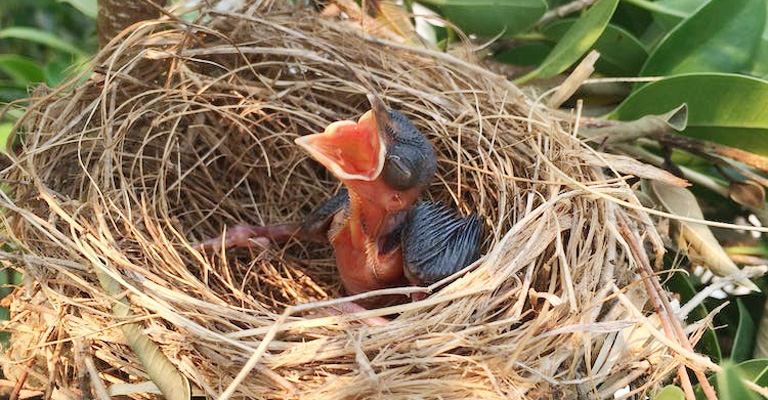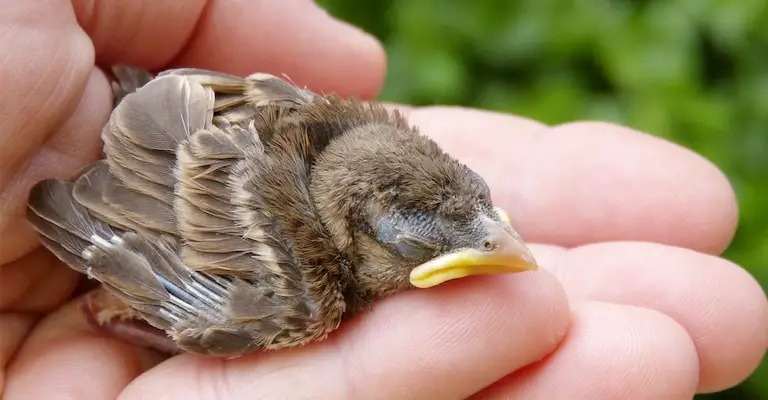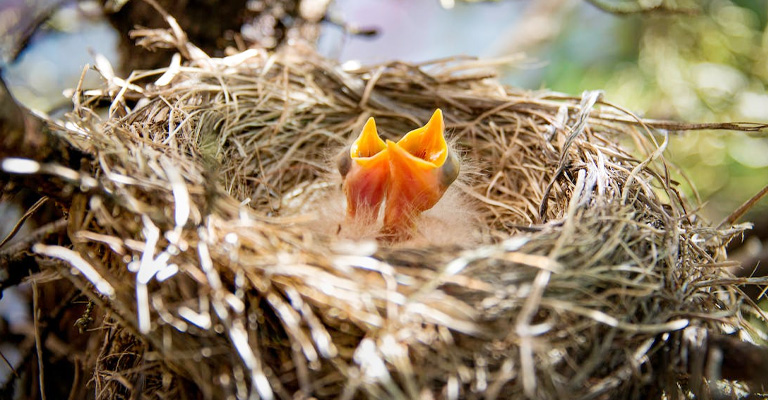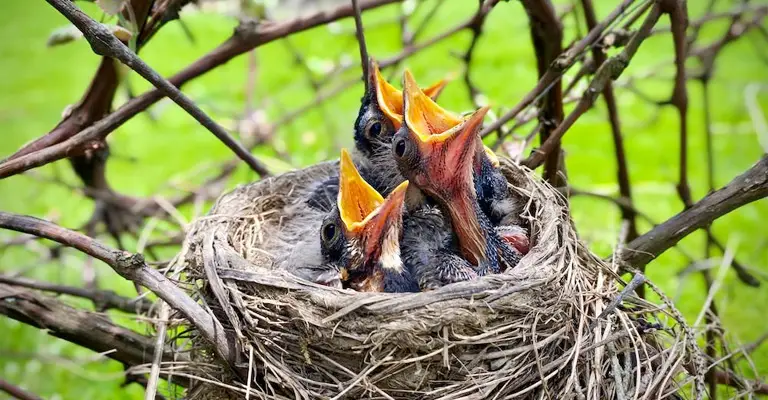Birds are wonderful creatures that can brighten up our days with their beautiful colors and songs. They are also very intelligent and social animals that have complex communication systems. Birds use different sounds and gestures to convey their emotions and needs to each other and us.
One of the most common and noticeable sounds that birds make is chirping. Chirping is a short and high-pitched vocalization that can have different meanings depending on the context and the species of the bird. Chirping can be used to attract mates, defend territories, warn of predators, or simply express happiness.
But what about baby birds? Why do they chirp so much? Is it normal or abnormal? Is it a sign of hunger or distress? How can we understand and help them?
In this article, we will explore the reasons why baby birds chirp so much. Also, we will also provide some tips on how to care for a baby bird that is chirping so much and How can you tell if your baby bird is distressed or just communicating.
![Why Is My Baby Bird Chirping So Much? [The Melodious Mystery]](https://theworldsrarestbirds.com/wp-content/uploads/2023/06/Why-Is-My-Baby-Bird-Chirping-So-Much-1.jpg)
Why Is My Baby Bird Chirping So Much?
Here are some potential explanations for why your baby bird may be chirping so much-
Hunger
One of the primary reasons baby birds chirp incessantly is hunger. Chirping is a vocal cue to their parents or caregivers, signaling their need for food. If your baby bird is chirping persistently, it may indicate that they are hungry and require feeding to satisfy their appetite.
Thirst
Similar to hunger, baby birds chirp to indicate their thirst. They rely on their parents or caregivers for water, and excessive chirping can be their way of communicating their need for hydration. Providing a fresh supply of water can help alleviate their chirping.
Cold or Discomfort

Baby birds may chirp excessively when they feel cold or uncomfortable. Chirping serves as a distress signal, alerting their parents or caregivers that they need warmth or relief from discomfort. Ensuring a suitable temperature and providing cozy nesting materials can help mitigate their chirping.
Loneliness or Separation
Baby birds are social creatures, and being separated from their parents or siblings can cause distress. Chirping incessantly is their way of seeking companionship and reassurance. Spending quality time with your baby bird and providing social interaction can help alleviate their loneliness.
Insecurity or Fear:
New or unfamiliar surroundings can make baby birds feel insecure or fearful. Excessive chirping may be their response to these emotions, as they seek comfort and protection from their parents or caregivers. Creating a safe and secure environment can help reduce their anxiety-related chirping.
Developmental Stage
Baby birds go through various developmental stages, and increased vocalization is a normal part of their growth and learning process.
Chirping allows them to explore their vocal abilities and develop communication skills. Understanding this natural progression can help you appreciate their chirping behavior.
Illness or Distress

Excessive chirping can also indicate illness or distress in baby birds. If your bird is unwell or experiencing discomfort, their increased vocalization may indicate the need for immediate attention and veterinary care. Monitoring their overall health and seeking professional advice is crucial in such cases.
Attention-seeking
Like any young animal, baby birds may chirp for attention. They quickly learn that chirping can attract their parents’ or caregivers’ focus and care. If they receive positive reinforcement, they may continue chirping to seek interaction and support or to express their presence.
Natural Instinct
Chirping is a natural behavior for baby birds; sometimes, they may chirp out of instinct. This behavior helps them establish their presence within their environment and serves as a vocal practice and communication development.
How Can You Tell If Your Baby Bird Is Distressed or Just Communicating?

Baby birds chirp for different reasons, such as hunger, fear, joy, or communication. Sometimes, it can be hard to tell if your baby bird is distressed or just communicating normally. However, some clues can help you distinguish between the two.
Some signs that your baby bird is distressed are:
- It chirps constantly or frequently
- It chirps louder and faster than usual
- It flaps its wings or tries to fly away
- It hides under its parents’ wings or feathers
- It crouches low or flattens its body
Some signs that your baby bird is just communicating are:
- It chirps occasionally or sporadically
- It chirps softly or gently
- It bobs its head up and down
- It sings or chatters cheerfully
- It clicks its beak softly
Useful Tips To Make Your Baby Bird Comfortable

When it comes to taking care of a baby bird, creating a comfortable and nurturing environment is crucial for its well-being. Here are some useful tips to help you make your baby bird feel at ease:
Warmth
Baby birds require a warm and cozy environment. Maintain a consistent temperature in the enclosure or nest box, typically around 85-90 degrees Fahrenheit (29-32 degrees Celsius). You can use a heat lamp or a heating pad (covered with a towel or cloth) to provide gentle warmth.
Nesting Material
Line the nest or enclosure with appropriate nesting material, such as soft bedding or shredded paper. This helps mimic the natural environment and provides a comfortable surface for the bird to rest on.
Privacy
Baby birds can feel stressed if they are constantly exposed to external stimuli. Ensure that the bird has a quiet and peaceful area where it can retreat and rest without disturbance.
Proper Lighting
Maintain a natural day-night cycle by providing appropriate lighting. Use a gentle, diffused light during the day and provide a dark environment at night, allowing the bird to rest properly.
Hygiene
Cleanliness is crucial for the health and comfort of the baby bird. Regularly clean the enclosure, replacing soiled bedding or nesting material, and remove any droppings. This helps prevent the buildup of bacteria or parasites.
Feeding Schedule
Establish a regular feeding schedule to ensure the baby bird receives proper nutrition. Research the specific dietary needs of the bird species and provide suitable food at appropriate intervals.
Consistent Feeding Technique
Develop a consistent feeding technique to reduce stress and make the bird feel more comfortable during feedings. Use a small syringe or a specialized feeding tool designed for baby birds to provide food gently and gradually.
Gentle Handling
Handle the baby bird with care and gentleness. Avoid excessive handling, as it can cause stress and potentially harm the bird. Minimize contact with necessary activities such as feeding, cleaning, or health checks.
Mimic Natural Environment
Try to replicate elements of the bird’s natural habitat within the enclosure. This can include providing branches or perches for the bird to perch on, as well as introducing appropriate toys or objects for stimulation.
Monitor Health
Regularly monitor the baby bird’s health and behavior. Look for signs of discomfort, distress, or illness, such as decreased appetite, lethargy, or unusual droppings. If you notice any concerns, consult a veterinarian or an avian specialist for guidance.
FAQ
The easiest way to tell the sex of a baby bird is by looking at its feathers. In some species of birds, such as parrots, males, and females have different colors or patterns on their feathers. For example, male budgies have blue ceres (the fleshy area above the beak), while female budgies have brown or beige ceres.
Baby birds are capable of learning to talk, but not all of them will do so. Some factors that influence their ability and willingness to talk are their species, personality, age, and environment. Some species of birds, such as parrots, are more likely to talk than others, such as finches. Some birds are more outgoing and vocal than others, such as cockatiels. Young birds are more likely to learn than old ones, as they are more impressionable and curious.
Bonding with your baby bird requires time, trust, and respect. You can bond with your baby bird by spending quality time with it every day, talking to it softly and gently, offering it treats and toys, and letting it out of its cage for supervised playtime. You can also teach your baby bird some tricks or commands to stimulate its intelligence and strengthen your bond.
Keeping your baby bird healthy and happy requires providing it with a suitable environment, a balanced diet, and regular care and check-ups. You should provide your baby bird with a spacious and sturdy cage that has enough room for flying, perching, playing, and resting.
You should also equip the cage with toys, swings, ladders, mirrors, bells, and other accessories to keep your baby bird entertained and stimulated.
The answer to this question depends on the species of the bird, as different birds have different growth rates and developmental stages. In general, however, most baby birds stay in the nest for at least 10 days before they are ready to fledge or fly away from the nest.
For some birds, such as songbirds, hummingbirds, swallows, and woodpeckers, this happens typically between two and three weeks old.
Conclusion
Baby birds are expressive animals that use their chirping to communicate their emotions and needs to their parents and us. By observing their chirping patterns and tones, you can understand what they are trying to tell you and how to respond accordingly.
Baby birds chirp so much for various reasons, such as hunger, fear, or joy. Depending on the context and the mood of the bird, this chirping can have different meanings and implications.
By knowing why baby birds chirp so much, you can better care for your feathered friend and enjoy a happy and healthy relationship with it.